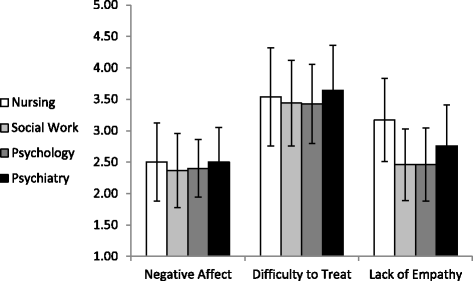The attitudes of psychiatric hospital staff toward hospitalization and treatment of patients with borderline personality disorder
- PMID: 25609479
- PMCID: PMC4307152
- DOI: 10.1186/s12888-014-0380-y
The attitudes of psychiatric hospital staff toward hospitalization and treatment of patients with borderline personality disorder
Abstract
Background: Negative attitudes towards patients with borderline personality disorder (BPD) may affect their treatment. We aimed to identify attitudes toward patients with BPD.
Methods: Clinicians in four psychiatric hospitals in Israel (n = 710; psychiatrists, psychologists, social workers and nurses) were approached and completed questionnaires on attitudes toward these patients.
Results: Nurses and psychiatrists reported encountering a higher number of patients with BPD during the last month, and exhibited more negative attitudes and less empathy toward these patients than the other two professions. The whole sample evaluated the decision to hospitalize such a patient as less justified than the decision to hospitalize a patient with Major Depressive Disorder. Negative attitudes were positively correlated with caring for greater numbers of patients with BPD in the past month and in the past 12 months. Nurses expressed the highest interest in studying short-term methods for treating patients with BPD and a lower percentage of psychiatrists expressed an interest in improving their professional skills in treating these patients.
Conclusions: The findings show that nurses and psychiatrists differ from the other professions in their experience and attitudes toward patients with BPD. We conclude that nurses and psychiatrists may be the target of future studies on their attitudes toward provocative behavioral patterns (e.g., suicide attempts) characterizing these patients. We also recommend implementing workshops for improving staff attitudes toward patients with BPD.
Figures
References
Publication types
MeSH terms
LinkOut - more resources
Full Text Sources
Other Literature Sources
Miscellaneous



